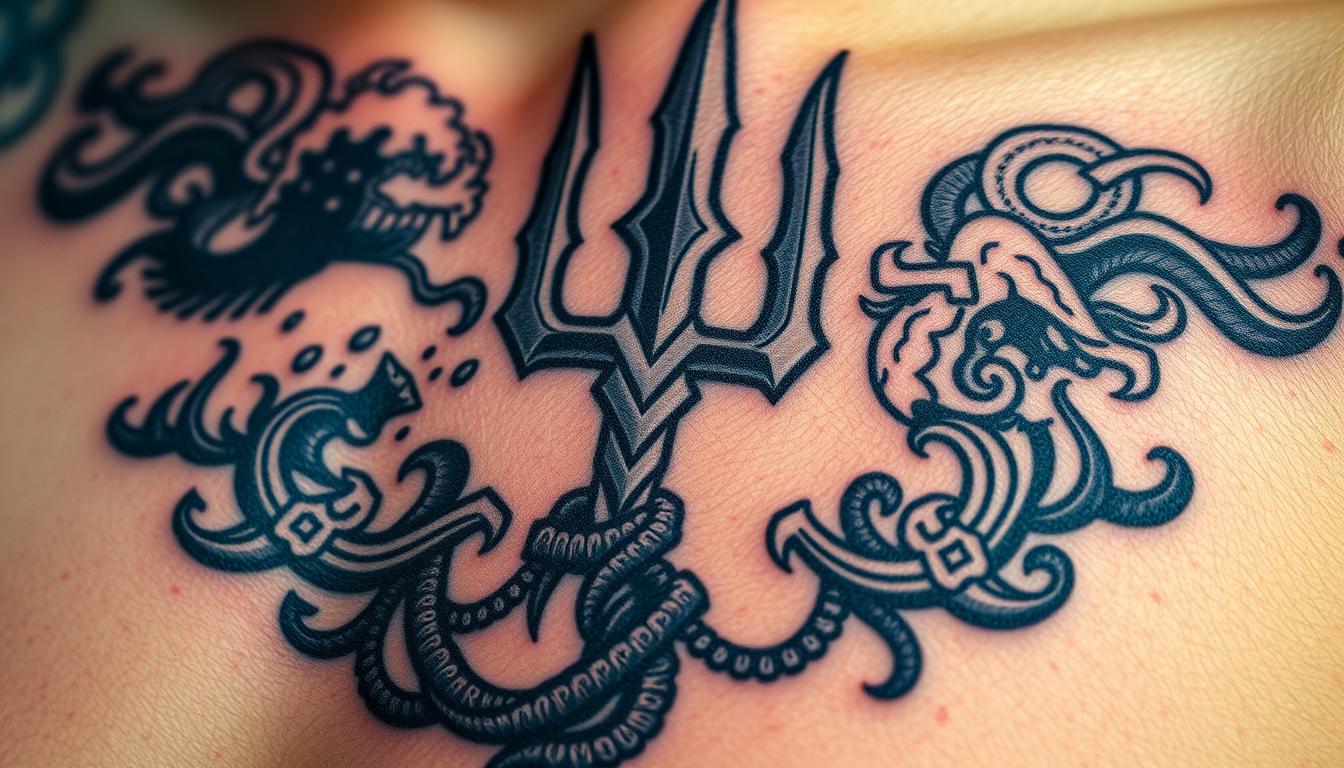Is getting a tattoo a sin? This question has sparked debate among religious communities for years. We’ll explore historical religious contexts, biblical interpretations, and diverse perspectives on tattoos today. You’ll gain insights from pastors and theologians about how tattoos relate to salvation and your relationship with deity. We’ll address common concerns and provide guidance for making a personal decision aligned with your faith. By the end, you’ll have a clearer understanding of this complex issue to inform your choices about body art.
Key Takeaways
- Tattoos have played significant roles in religious contexts throughout history, often symbolizing covenant and devotion
- Biblical interpretations of tattoos involve analyzing Leviticus 19:28 and comparing Old and New Testament teachings
- Religious perspectives on tattoos vary widely among Christian denominations and other faiths
- Personal motivations, body as temple concept, and balancing self-expression with spiritual beliefs are crucial considerations
- Seeking guidance through prayer, consulting faith leaders, and weighing personal convictions help in decision-making about tattoos
Understanding Tattoos in Historical Religious Contexts

Tattoos have played significant roles in religious contexts throughout history. Ancient cultures often used body markings in spiritual practices, while sacred texts like the gospel contain references to tattoos. These markings held deep religious significance, often symbolizing covenant, righteousness, or devotion to deities. Understanding this historical context is crucial when examining the question of tattoos and sin in relation to Jesus and prayer.
Tattoos in Ancient Cultures and Spiritual Practices
In ancient cultures, tattoos often held deep spiritual significance, serving as markers of identity, status, and religious devotion. The practice of tattooing was closely tied to spiritual beliefs and rituals, with various cultures using skin markings to connect with their deities or ancestors. Ancient Egyptians, for example, used tattoos in religious ceremonies, while Polynesian cultures incorporated intricate tattoo designs as part of their spiritual traditions. These practices often involved complex rituals and were governed by strict laws, reflecting the reverence with which tattoos were regarded in religious contexts:
| Culture | Tattoo Significance | Religious Context |
|---|---|---|
| Ancient Egypt | Protection and healing | Associated with goddess Hathor |
| Polynesia | Spiritual power and ancestry | Connected to ancestral spirits |
| Coptic Christians | Faith affirmation | Symbol of religious identity |
References to Tattoos in Sacred Texts
Sacred texts, including the New Testament, contain references to tattoos and body markings. While the Old Testament mentions prohibitions against certain markings, the New Testament focuses on the spiritual transformation of Christians through the resurrection of Jesus. The apostle Paul’s writings emphasize the importance of the soul and inner transformation rather than outward appearances. This shift in focus from physical markings to spiritual renewal has influenced Christian perspectives on tattoos, with some viewing them as a form of evangelism or personal expression of faith.
The Significance of Body Markings in Religious History
Body markings have played a significant role in religious history, with tattoos holding particular importance in various faith traditions. The Old Testament, specifically the book of Leviticus, mentions tattoos in the context of prohibitions, while other cultures embraced them as expressions of faith. Throughout history, tattoos have served as symbols of religious identity, devotion, and spiritual protection. The Bible’s complex relationship with tattoos reflects the evolving understanding of faith and personal expression across different cultures and time periods:
| Religious Tradition | Tattoo Significance | Biblical Reference |
|---|---|---|
| Ancient Israelites | Prohibited | Leviticus 19:28 |
| Early Christians | Symbol of faith | Galatians 6:17 |
| Coptic Christians | Religious identity | N/A |
Biblical Interpretations Concerning Tattoos

Biblical interpretations of tattoos involve analyzing Leviticus 19:28, comparing Old Testament laws with New Testament teachings, and contextualizing scriptural passages on body art. These interpretations consider the Israelites’ historical context, concerns about idolatry, and the significance of blood in religious practices. Understanding these perspectives helps explore whether tattoos conflict with glorifying God or align with Satan’s influence.
Analyzing Leviticus 19:28 and Its Implications
Leviticus 19:28 prohibits cutting the body for the dead and tattooing marks on oneself. Interpreting this verse requires understanding its historical context and the broader biblical narrative. While some view this as a universal ban on tattoos, others consider it specific to ancient Israelite practices. The book of Isaiah mentions divine tattoos, suggesting a nuanced perspective on body markings. Ultimately, the interpretation of this verse often depends on one’s understanding of Old Testament law in light of Christ’s resurrection and its implications for Christian conscience and divinity.
Old Testament Laws Versus New Testament Teachings
The Old Testament laws, including prohibitions against tattoos, were part of the ancient Israelites’ covenant with God, often aimed at distinguishing them from pagan practices. However, the New Testament introduces a new covenant through Jesus Christ, emphasizing wisdom and spiritual transformation over strict adherence to ritual laws. This shift in focus has led many Christians to view Old Testament prohibitions on tattoos as no longer binding, interpreting them in light of the gospel’s message of grace and freedom. The apostle Paul’s teachings, in particular, emphasize that salvation and entrance into heaven are based on faith in Christ rather than observance of Old Testament laws.
Contextualizing Scriptural Passages on Body Art
Contextualizing scriptural passages on body art requires understanding the cultural and religious significance of tattoos in biblical times. While some interpret Leviticus 19:28 as a universal prohibition, others view it as a specific instruction to ancient Israelites to avoid pagan worship practices. The New Testament emphasizes love and blessings over strict adherence to Old Testament laws, shifting the focus from outward appearances to inner spiritual transformation. This change in perspective has led many Christians to reconsider whether getting a tattoo constitutes a sin or can be a form of worship and expression of faith:
- Old Testament: Prohibition against tattoos in specific contexts
- New Testament: Emphasis on faith, love, and spiritual transformation
- Modern interpretation: Diverse views on tattoos as expressions of faith or potential sins
- Cultural context: Consideration of tattoos’ historical significance in religious practices
Diverse Religious Perspectives on Tattoos Today

Religious perspectives on tattoos vary widely among Christian denominations and other faiths. Views range from strict prohibition to acceptance as forms of expression. Cultural influences shape these opinions, affecting interpretations of biblical texts and theological concepts. This diversity reflects ongoing debates about body modification in religious contexts, touching on themes of temple, God, and Gentile practices.
Views Within Different Christian Denominations
Christian denominations hold diverse views on tattoos, ranging from strict prohibition to acceptance as personal expression. Some conservative groups interpret biblical passages, particularly from Leviticus, as a clear prohibition against tattoos, viewing them as potential symbols of demonic influence. Others, especially more liberal denominations, focus on the gospel message of grace and individual conscience, questioning whether tattoos conflict with one’s faith. The debate often involves considerations of cultural context, personal symbolism, and the role of the body as a temple in Christianity. This diversity of perspectives reflects the ongoing dialogue within Christianity about the intersection of faith, culture, and personal expression:
| Denomination | View on Tattoos | Reasoning |
|---|---|---|
| Conservative Evangelical | Generally opposed | Literal interpretation of Leviticus |
| Catholic | Varies | Focus on intention and content |
| Progressive Protestant | Often accepting | Emphasis on personal faith expression |
Interpretations in Other Faiths and Belief Systems
Various faiths and belief systems hold diverse interpretations regarding tattoos. Some traditions, like Buddhism and Hinduism, have long-standing practices of sacred tattoos, viewing them as expressions of devotion or spiritual protection. In contrast, Islamic teachings generally prohibit permanent tattoos, considering them alterations of God’s creation. Judaism maintains a complex relationship with tattoos, rooted in the prohibition found in Leviticus, though interpretations vary among different Jewish movements. These diverse perspectives reflect the interplay between religious texts, cultural traditions, and evolving societal norms:
| Faith/Belief System | View on Tattoos | Key Factors |
|---|---|---|
| Buddhism | Often accepted | Sacred symbols, protection |
| Islam | Generally prohibited | Altering God’s creation |
| Judaism | Varies by movement | Biblical prohibition, cultural shifts |
The Role of Cultural Influence on Religious Opinions
Cultural influences play a significant role in shaping religious opinions on tattoos, often intersecting with interpretations of the Ten Commandments and concepts of sacrifice. As societies evolve, so do perspectives on whether it is a sin to get a tattoo. Religious leaders and communities must navigate the tension between traditional teachings and contemporary cultural norms, considering factors such as artistic expression, personal identity, and cultural heritage. This ongoing dialogue reflects the complex relationship between faith, culture, and individual choice, challenging believers to examine their reasons for getting tattoos and how these decisions align with their religious convictions.
Ethical and Moral Considerations of Getting a Tattoo

Ethical and moral considerations play a crucial role in the decision to get a tattoo. This section explores personal motivations, the concept of the body as a temple, and balancing self-expression with spiritual beliefs. These factors contribute to the complex question of whether getting a tattoo conflicts with religious principles or can be a meaningful expression of faith.
Evaluating Intentions and Personal Motivations
When considering whether getting a tattoo is a sin, individuals must evaluate their intentions and personal motivations. This introspection involves examining the reasons behind the desire for a tattoo and how it aligns with one’s faith and values. Motivations can range from personal expression to commemorating significant life events or expressing religious devotion. Understanding these underlying factors helps individuals make informed decisions that align with their spiritual beliefs and ethical standards:
- Self-expression: Reflecting personal identity or beliefs
- Commemoration: Honoring important events or people
- Religious devotion: Expressing faith through symbolic imagery
- Cultural connection: Honoring heritage or traditions
- Aesthetic appeal: Appreciating tattoos as an art form
The Body as a Temple: Respecting One’s Self
The concept of the body as a temple, derived from biblical teachings, emphasizes the importance of respecting and caring for one’s physical form. This perspective influences the debate on whether tattoos are sinful, as some argue that modifying the body through tattooing may conflict with the idea of preserving the body as a sacred vessel. Others interpret this concept more broadly, suggesting that tattoos can be a form of honoring the body when chosen thoughtfully and with spiritual intent. The interpretation of this principle often depends on individual beliefs and denominational teachings:
| Perspective | View on Tattoos | Reasoning |
|---|---|---|
| Conservative | Against | Preserving body’s natural state |
| Moderate | Conditional | Depends on tattoo’s meaning and intent |
| Liberal | Accepting | Body art as self-expression or worship |
Balancing Personal Expression With Spiritual Beliefs
Balancing personal expression with spiritual beliefs requires careful consideration when deciding whether to get a tattoo. Individuals must weigh their desire for self-expression against their religious convictions, considering how a tattoo might align with or contradict their faith. This process involves examining scriptural teachings, seeking guidance from religious leaders, and reflecting on personal motivations. Many find ways to harmonize their faith with tattoos by choosing designs that reflect their spiritual values or using body art as a form of witness. Others may decide against tattoos to adhere strictly to their interpretation of religious texts. Ultimately, the decision requires thoughtful reflection and often depends on one’s understanding of faith, personal convictions, and cultural context:
- Examine scriptural teachings and denominational perspectives
- Seek guidance from religious leaders or mentors
- Reflect on personal motivations and spiritual alignment
- Consider the potential impact on one’s faith community
- Explore ways to express faith through alternative means if necessary
Personal Faith and Individual Decision-Making

Personal faith and individual decision-making play crucial roles in determining whether getting a tattoo is considered sinful. This section explores seeking guidance through prayer and reflection, consulting with faith leaders and community members, and weighing personal convictions against religious teachings. These approaches help individuals navigate the complex intersection of faith, culture, and personal expression when considering tattoos.
Seeking Guidance Through Prayer and Reflection
Seeking guidance through prayer and reflection forms a crucial step for individuals grappling with the question of whether getting a tattoo is sinful. This process involves quiet contemplation, studying religious texts, and opening oneself to divine guidance. Many find that dedicated prayer time helps clarify their thoughts and aligns their decisions with their faith. Reflection allows for a deeper examination of personal motivations and potential spiritual implications, enabling individuals to make choices that resonate with their beliefs and values.
Consulting With Faith Leaders and Community Members
Consulting with faith leaders and community members provides valuable insights when deciding whether getting a tattoo aligns with one’s religious beliefs. These conversations offer diverse perspectives, theological knowledge, and practical experiences that can inform personal decision-making. Faith leaders can provide guidance on scriptural interpretations and denominational teachings, while community members may share their own experiences and reflections. This collaborative approach helps individuals navigate the complexities of faith and culture, ensuring a well-rounded understanding of the issue:
- Seek counsel from religious authorities familiar with scriptural teachings
- Engage in discussions with trusted community members
- Consider diverse perspectives within the faith tradition
- Reflect on personal experiences shared by others
- Integrate insights gained into personal decision-making process
Weighing Personal Convictions Against Religious Teachings
Weighing personal convictions against religious teachings requires careful consideration when deciding if getting a tattoo is sinful. Individuals must examine their motivations, evaluate the compatibility of tattoos with their faith’s principles, and consider the potential impact on their spiritual life. This process involves critical thinking, self-reflection, and a thorough understanding of one’s religious beliefs. By carefully balancing personal desires with religious guidance, individuals can make informed decisions that align with their faith while respecting their individual convictions.
Common Questions About Tattoos and Sin Addressed

This section addresses common questions about tattoos and sin. It explores how tattoos might affect spiritual journeys, examines different views on body art forms, and discusses navigating family and societal expectations regarding tattoos. These topics provide insights into the complex relationship between tattoos, faith, and personal beliefs.
Can Tattoos Affect One’s Spiritual Journey?
Tattoos can influence one’s spiritual journey, depending on personal beliefs and interpretations of faith. Some individuals find that tattoos deepen their spiritual connection, serving as reminders of their faith or important life lessons. Others may experience internal conflict if their tattoos conflict with religious teachings or community expectations. The impact of tattoos on spirituality often depends on the individual’s intentions, the symbolism of the tattoo, and how it aligns with their personal faith journey.
Are All Forms of Body Art Viewed Equally?
Various forms of body art, including tattoos, piercings, and scarification, are viewed differently across religious and cultural contexts. While some faiths may accept certain forms of body modification, they might reject others based on scriptural interpretations or traditional practices. The acceptance of different body art forms often depends on factors such as permanence, cultural significance, and perceived spiritual implications. Individuals and religious communities may hold nuanced views on these practices, considering their historical context, symbolism, and potential impact on one’s relationship with the divine.
Navigating Family and Societal Expectations Regarding Tattoos
Navigating family and societal expectations regarding tattoos requires open communication and understanding. Individuals considering tattoos may face resistance from family members or social circles with differing views on body art. This situation often calls for respectful dialogue, explaining personal motivations, and addressing concerns about religious implications. Some may choose to compromise by selecting tattoo designs or locations that are less visible or controversial, while others might delay getting a tattoo until they feel more confident in their decision. Ultimately, balancing personal desires with respect for family values and societal norms remains a personal journey that varies for each individual.
Conclusion
Exploring the question of whether getting a tattoo is a sin reveals a complex interplay of historical, cultural, and religious factors. Biblical interpretations, diverse religious perspectives, and personal convictions all contribute to the ongoing debate surrounding tattoos and faith. Ultimately, the decision to get a tattoo involves careful consideration of one’s spiritual beliefs, intentions, and the potential impact on one’s relationship with God and community. By seeking guidance through prayer, reflection, and consultation with faith leaders, individuals can make informed choices that align with their personal faith journey and respect their religious traditions.
























































































